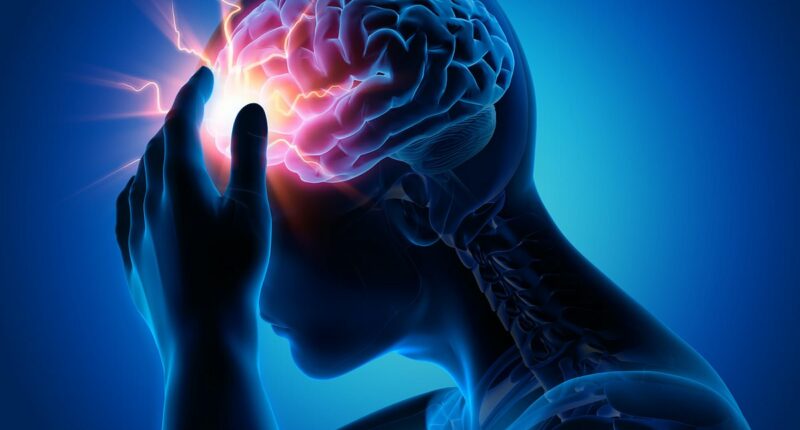Share this @internewscast.com
Doctors nationwide are warning of a sharp rise in psychotic episodes tied to high-potency marijuana products, which are now far stronger than in decades past.
Some marijuana vapes contain up to 98 percent THC, the chemical responsible for the drug’s psychoactive effects, levels that experts say are driving a surge in mental health crises.
Dr Drew Pinsky, an addiction specialist and TV personality, said Friday: ‘The concentration of cannabis is so high… we are seeing a significant uptick in psychotic illness,’ adding that cannabis ‘makes people with psychotic illness much worse.’
The warnings come as marijuana legalization continues to expand. Recreational use is now legal in 24 states and Washington, DC, creating a $20 billion industry, and a black market, flooded with ultra-potent products in the form of edibles, dabs, oils, and vapes.
Doctors and researchers have said that these products are fueling a public health crisis that is still unfolding.
‘We’ve seen the marked incidence of trouble, mostly caused by the high potency of cannabis,’ Dr Drew said.
‘So now we are seeing people who are unable to function, they have difficulty at work, psychotic episodes, mood disturbances, and severe addiction.’
Polling from 2023 suggests nearly 44 million Americans use marijuana, with 18 million consuming it daily or near daily.

Polling from 2023 puts the number of Americans who consume marijuana at around 44 million – about 17 percent of the adult population
Many seek it out to ease anxiety or depression. But growing research shows high doses of THC may do just the opposite, disrupting mood, distorting reality, and triggering temporary or even prolonged psychosis.
The issue is especially concerning in young adults, whose brains are still developing.
Regular use of potent cannabis in adolescence has been linked to long-term changes in brain structure, particularly in the prefrontal cortex, the region responsible for decision-making, emotional regulation, and impulse control.
This is also the age when many psychotic disorders first appear.
Emerging data suggest the link is more than just a coincidence. THC may trigger schizophrenia or psychotic episodes in individuals with genetic predispositions.
A 2022 review by University of Bath researchers, which analyzed 20 studies involving 120,000 people, found users of high-potency cannabis were four times more likely to develop addiction and three to five times more likely to suffer a psychotic break compared to those using lower-potency strains.
Earlier this year, a report in JAMA Network Open found that, emergency room visits in Ontario, Canada, linked to schizophrenia in marijuana users tripled after legalization.
Between 2006 and 2022, the rate of schizophrenia among those with cannabis use disorder climbed from four percent to over 10 percent. In contrast, just 0.6 percent of non-users developed the condition.
Doctors across the US have echoed the concerns raised by Dr Drew since the wave of state-level legalization began about 15 years ago.

Dr Drew Pinsky, who warned of the increased risk of psychosis tied to highly potent forms of THC, is pictured with his daughter Paulina, who sought professional treatment for cannabis use disorder

Cannabis is becoming easier to access and more potent. The graph refers to smokable cannabis. Other forms, such as vapes, contain up to 98 percent of THC, the psychoactive chemical in the drug linked to psychosis
What was once considered a mellow, low-risk drug is now being reexamined in light of products that bear little resemblance to the marijuana of past generations.
Between 1995 and 2022, THC levels in cannabis seized by law enforcement quadrupled, from 3.96 percent to 16.14 percent, while modern concentrates can exceed 90 percent.
Despite the public perception of marijuana as a natural remedy for anxiety or depression, the evidence is mounting that today’s potent products come with serious psychological risks.
Millions who turn to marijuana for relief may be unaware of its potential to cause temporary psychosis lasting hours, days, or even months. And while marijuana may not lead to physical dependence like opioids or alcohol, experts say the psychological grip can be just as damaging.
As legalization spreads and access grows, the consequences are becoming harder to ignore.
With each new study, the case against high-potency marijuana, and its role in rising mental health issues, continues to build.


Rihanna and Miley Cyrus have both been open about their marijuana use
In 2023, the journal Psychological Medicine published the largest epidemiological investigation to date that focused exclusively on the link between cannabis use and schizophrenia.
Researchers analyzed Danish health records from 1972 to 2021, spanning 6.9 million individuals, which revealed that 30 percent of schizophrenia cases in men aged 21 to 30 (roughly 3,000 diagnoses) could have been avoided if they had not developed cannabis use disorder.
When researchers broadened their analysis to include a wider age group (ages 16 to 49, instead of just 21 to 30), the estimated impact of cannabis use disorder on schizophrenia risk decreased to 15 percent.
Carsten Hjorthøj, the study’s lead author and an associate professor at the University of Copenhagen, told Scientific American: ‘We found that the proportion of cases of schizophrenia that were attributable to cannabis use disorder, and those that might have been prevented, was much higher in males than females and, in particular, younger males in whom the brain is still maturing.
‘And we saw that this increase was taking place over time, completely in parallel with the increasing potency of cannabis.’
The brain adapts to frequent THC exposure by dialing down its natural cannabinoid production, which helps regulate both mood and appetite.
Chronic use teaches the brain to rely on external THC instead of making its own neurotransmitters, a process called neuroadaptation.
It can take weeks or months for this balance to reset, which can trigger irritability, insomnia, or cravings. For heavy users, these withdrawal symptoms are distressing enough that some clinics prescribe medications like gabapentin to ease the transition.












